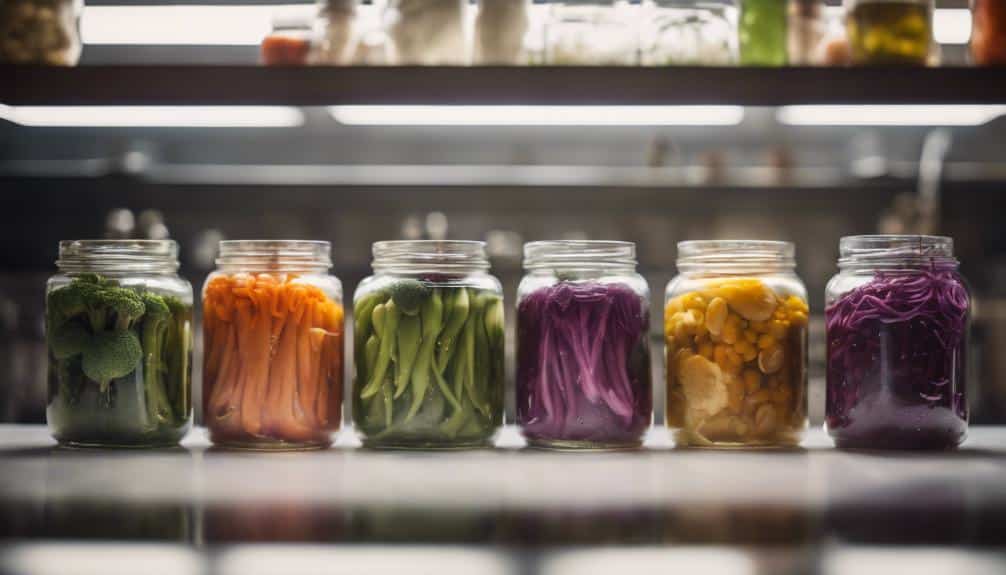There are many benefits of fermenting vegetables and foods like cabbage, carrots, and cucumbers. Enhance flavors, preserve nutrients, and boost gut health. Experiment with spices and fruits for unique tastes.
Avoid fermenting zucchini or lettuce.
Let’s explore more about fermenting your urban garden produce.
Why ferment vegetables?
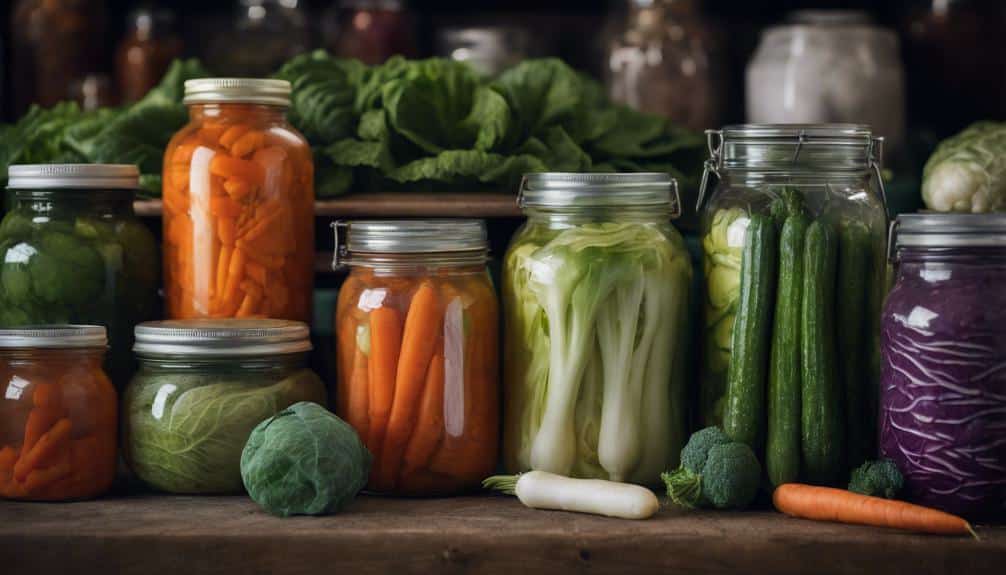
Fermenting vegetables enhances their flavor and nutritional value. Health benefits of fermenting vegetables include the preservation of nutrients and the promotion of gut health through probiotics. The process reveals essential vitamins and minerals, making them more accessible for your body to absorb. Not only does fermentation increase the longevity of vegetables, but it also enhances their digestibility.
Flavor profiles transform during fermentation, producing tangy, savory, and sometimes slightly effervescent tastes. The unique tanginess that fermentation imparts can add depth and complexity to dishes, elevating their overall taste. Through the preservation of vegetables via fermentation, you can enjoy seasonal produce long after it’s out of season.
Cultural traditions play a significant role in fermenting vegetables. Many cultures have a rich history of fermenting foods as a way to preserve harvests for extended periods. Each culture brings its own unique flavors and techniques to the fermentation process, showcasing the diversity and creativity that can be achieved through this age-old practice.
What foods can you ferment?
Fermenting a variety of foods, not just vegetables, can be crucial. Consider trying fruits, dairy products like yogurt, or even beverages like kombucha.
Each type of food will have its own fermentation process and timeline, so make sure to research and follow specific instructions for the best results.
Some foods, like those high in preservatives or additives, may not be suitable for fermentation, so it’s important to choose your ingredients wisely.
Fermented foods from vegetables
Regularly overlooked in daily meal preparation, a wide variety of vegetables can be transformed through fermentation into delicious and nutritious foods.
Some popular fermented foods from vegetables include fermented pickles and kimchi, sauerkraut variations, as well as homemade kombucha and kefir. These fermented foods not only offer unique flavors but also provide beneficial probiotics that support gut health.
Experimenting with different vegetables and flavors can lead to exciting creations that enhance your meals. Below is a table showcasing some common fermented vegetable foods:
| Fermented Pickles, Kimchi | Sauerkraut Variations | Homemade Kombucha, Kefir |
|---|---|---|
| Crunchy and tangy pickles | Classic and flavored | Probiotic-rich drinks |
| Spicy and flavorful kimchi | Red cabbage or carrot | Fermented tea or milk |
| Great for snacking | Excellent for hot dogs | Invigorating and tangy |
How long to ferment veggies?
When fermenting vegetables, the duration of fermentation varies depending on the type of vegetable and desired flavor profile. The fermentation process can range from a few days to several weeks.
The health benefits of fermented veggies include increased gut health due to the presence of probiotics and improved digestion. Experimenting with different recipe variations can lead to unique and delicious outcomes.
For a milder flavor, ferment for a shorter period, while a longer fermentation time results in a tangier taste. Remember, the key is to taste the veggies during the fermentation process to achieve the desired flavor.
Try out various spices, herbs, or even fruits to create your signature fermented vegetable dish. Enjoy the process and savor the health benefits of homemade fermented veggies!
What vegetables should not be fermented?
Certain vegetables aren’t suitable for fermentation due to their high water content or texture, while others, like cabbage, carrots, and cucumbers, are ideal for the fermentation process.
When it comes to fermenting fruits, be cautious as they can attract harmful bacteria more easily than vegetables. To guarantee food safety, it’s best to avoid fermenting vegetables like zucchini, lettuce, and radishes due to their high water content, which can result in a mushy and unappealing texture.
If you’re looking for non-fermented alternatives for vegetable preservation, consider pickling or freezing these veggies instead. Pickling involves preserving vegetables in a vinegar solution, while freezing helps maintain their texture and flavor.
Benefits of fermented foods
When it comes to fermented foods, you might be wondering how fermentation boosts the nutritional value of your food.
Fermented foods are known to be rich in probiotics, which are beneficial for your gut health.
These points highlight just a couple of the many benefits that fermented foods can offer your overall well-being.
How does fermentation increase nutrition?
Fermentation enhances the nutritional quality of foods by increasing the bioavailability of essential nutrients.
- Increased vitamin content: Fermentation can boost the levels of certain vitamins like B vitamins and vitamin C in foods.
- Enhanced mineral absorption: Fermentation breaks down compounds that inhibit mineral absorption, making minerals like iron and zinc more available to your body.
- Improved gut health: The live cultures in fermented foods support a healthy gut microbiome, which is linked to better digestion and overall well-being.
These benefits highlight how fermenting foods can’t only preserve them but also increase their nutritional value, making them a valuable addition to your diet.
Probiotics in fermented food
Have you ever wondered how probiotics in fermented foods contribute to your overall health and well-being?
Probiotics are live bacteria and yeasts that are beneficial for your digestive system. The fermentation process enhances probiotics efficiency, increasing the number of these good microorganisms in the food.
When you consume fermented foods like kimchi or yogurt, you introduce these probiotics into your gut, where they can promote gut health benefits. These friendly bacteria help maintain a healthy balance in your gut flora, aiding digestion and supporting your immune system.
Disadvantages of fermenting food
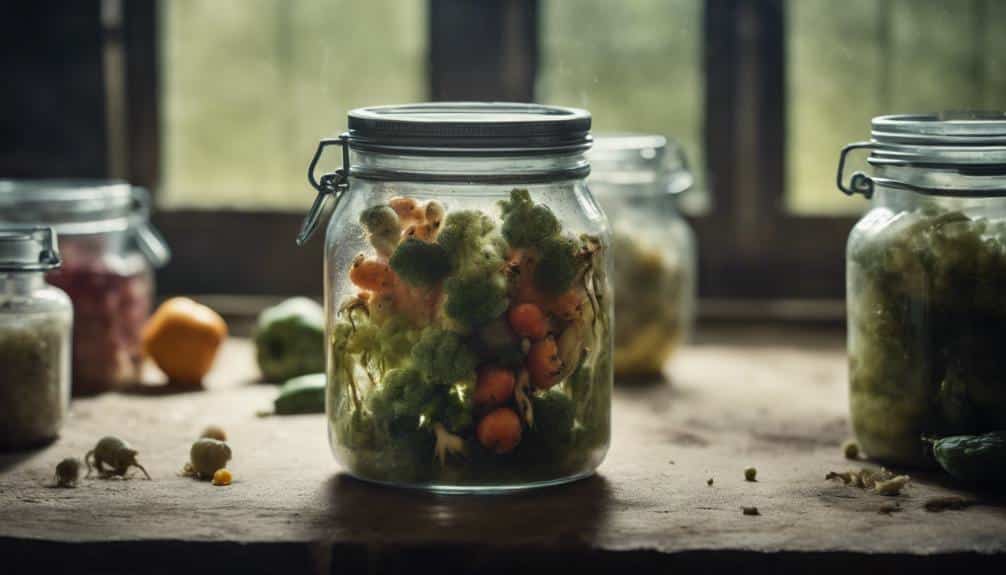
While fermenting food can offer various health benefits, it’s important to be aware of the potential drawbacks that come with the process.
- Fermentation risks: Fermenting food introduces the risk of harmful bacteria growth if not done correctly, leading to foodborne illnesses.
- Spoilage concerns: Improper fermentation or contamination can result in the food spoiling, causing an unpleasant taste and potentially dangerous consumption.
- Handling precautions: It’s vital to maintain proper hygiene during the fermentation process to prevent contamination and ensure the safety of the fermented food.
Being mindful of these disadvantages and taking necessary precautions can help you enjoy the benefits of fermented foods without encountering these potential risks.
Remember to follow recommended fermentation guidelines, use clean equipment, and monitor the fermentation progress closely to minimize the likelihood of drawbacks.
How long do fermented foods last?
Properly fermented foods can last for an extended period when stored correctly. Fermented food safety is important to make sure that your homemade goodies stay safe to eat. When storing fermented foods, make sure to keep them in airtight containers in the refrigerator. This helps maintain their freshness and prevents any contamination.
The shelf life of fermented foods varies depending on the type of food and how well it was fermented. Generally, most fermented foods can last anywhere from a few weeks to several months.
To guarantee the longevity of your fermented foods, label them with the date they were made. This way, you can keep track of how long they’ve been stored and when it’s time to consume them.
Why avoid fermented foods?
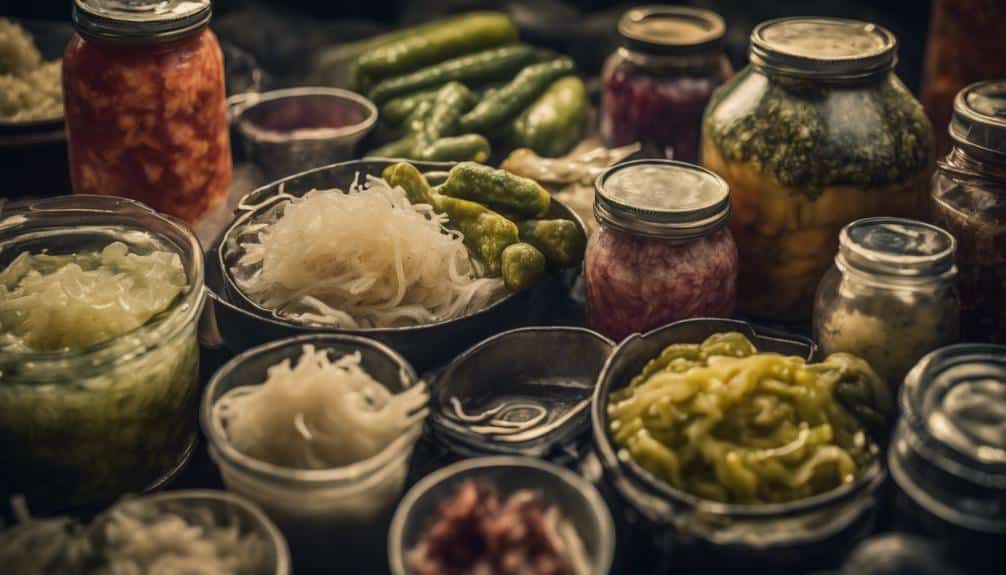
Avoiding fermented foods may be advisable for individuals who experience side effects like bloating, gas, or digestive discomfort. If you have a compromised immune system or suffer from conditions like histamine intolerance, it’s best to steer clear of fermented veggies and other such foods.
Knowing who should avoid these foods can help you make informed choices about your diet and overall health.
Side effects of fermented vegetables
What’re the potential side effects of consuming fermented vegetables and why might you want to be cautious about including them in your diet?
Fermented foods can offer health benefits, but there are some risks to be aware of. Here are a few reasons why you may want to approach fermented vegetables with caution:
- Health risks
- Allergic reactions
- Digestive issues
These side effects can vary from person to person, so it’s essential to pay attention to how your body reacts when introducing fermented foods into your diet. If you notice any adverse effects, it may be best to limit or avoid consuming them to maintain your overall well-being.
Who should not eat fermented foods?
If you have a compromised immune system or are sensitive to histamine, you should consider avoiding fermented foods to prevent potential adverse reactions. Health conditions such as these can make it challenging for your body to handle the bacteria present in fermented foods, leading to allergic reactions or digestive issues.
If you’re on certain medications that could interact negatively with the probiotics in fermented foods, it’s best to consult with a healthcare provider before consuming them. Pregnant individuals may also want to exercise caution with fermented foods due to the risk of harmful bacteria.
Non-food products created by fermentation
Fermentation can be utilized to create various non-food products, offering a sustainable and eco-friendly alternative to traditional manufacturing processes.
- Non food fermentation applications: Beyond food, fermentation extends to the production of items like biofuels, bioplastics, and pharmaceuticals, contributing to a greener future.
- Fermented skincare products: Harnessing the power of probiotics, fermented skincare products promote healthy skin by balancing its microbiome, enhancing its natural defense mechanisms.
- Fermented cleaning products: Utilizing fermentation to create eco-friendly cleaning solutions helps reduce chemical exposure in your home while being effective in maintaining cleanliness.
These non-food applications of fermentation showcase the versatility of this age-old process, demonstrating its potential to revolutionize various industries.
Whether you’re looking for sustainable alternatives in skincare, cleaning, or even fuel production, exploring the world of non-food fermentation products can lead to innovative solutions that benefit both you and the environment.
How many fermented foods per day?
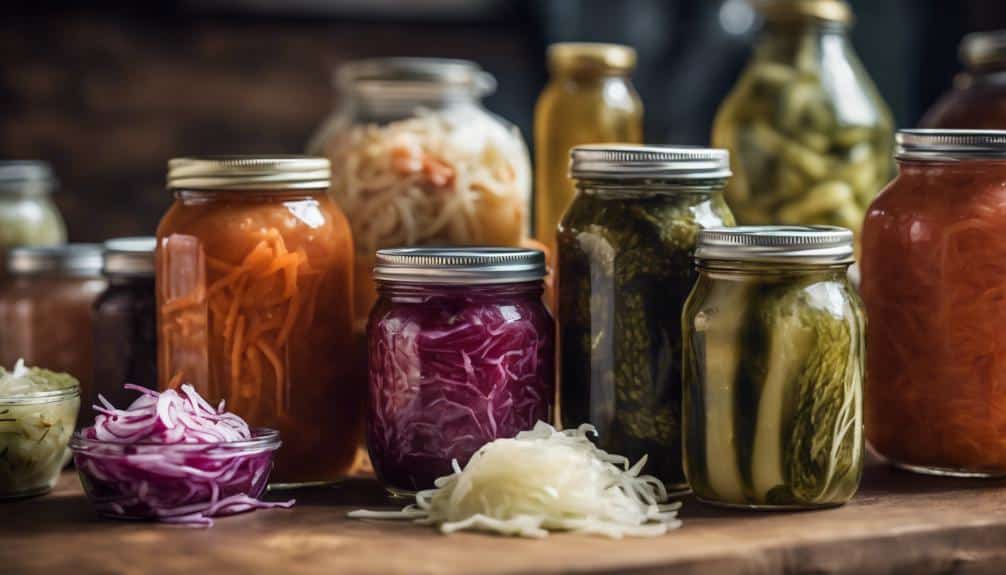
Consider incorporating a variety of fermented foods into your daily diet to support your gut health and overall well-being. Including fermented drink options like kefir, kombucha, or traditional buttermilk can offer an invigorating way to introduce probiotics into your system.
These beverages not only taste great but also provide a myriad of health benefits such as improved digestion, strengthened immune system, and increased nutrient absorption.
For top-notch gut health, it’s recommended to consume at least 2-3 servings of fermented foods per day. This could include a combination of fermented vegetables like sauerkraut or kimchi, dairy products like yogurt or kefir, and fermented drinks like kombucha.
By diversifying the types of fermented foods you consume, you can introduce a range of beneficial bacteria strains to your gut microbiome, promoting a balanced and healthy digestive system.
Easiest fermented foods to make?
One of the easiest fermented foods to make at home is homemade sauerkraut. If you’re new to fermentation, starting with sauerkraut can be a great way to dip your toes into the world of fermenting foods.
Here are some other options you might want to explore:
- Quick fermentation techniques: Try making a batch of kimchi, a spicy Korean fermented cabbage dish. It’s flavorful, easy to prepare, and can be ready in just a few days.
- Fermented fruit options: Fermented fruits like apple chutney or pineapple salsa are delicious and simple to make. The natural sugars in the fruits provide a great base for fermentation.
- Beginner fermentation recipes: For those just starting out, pickled cucumbers or carrots are excellent beginner recipes. They require minimal ingredients and equipment, making them perfect for beginners.
Experiment with these different alternatives to find what suits your taste buds and skill level best.
Why can’t Muslims eat fermented food?
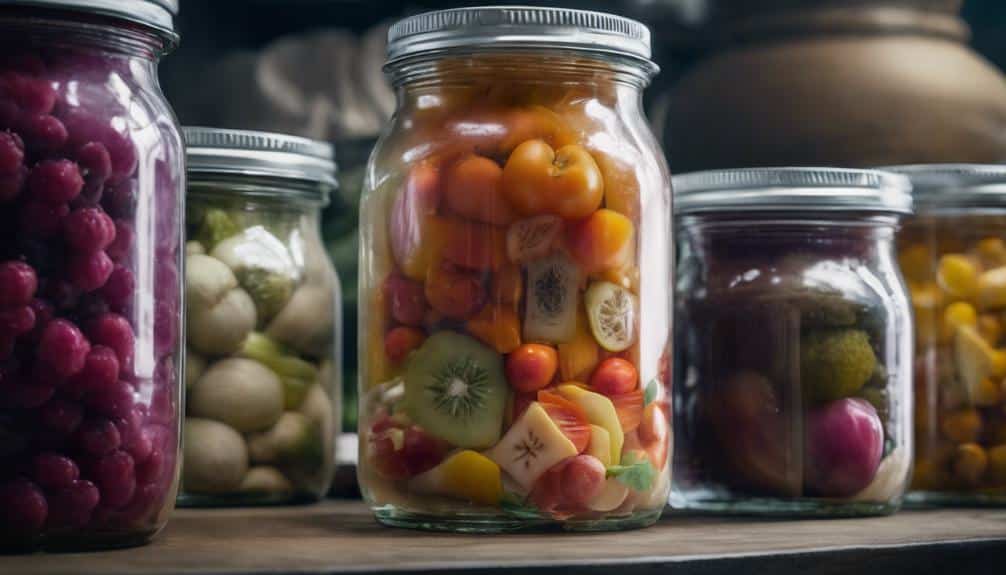
If you’re wondering about the dietary restrictions in Islam, you may have questioned why Muslims avoid consuming fermented food. In Islam, there are specific dietary laws that outline what’s permissible (halal) and what’s forbidden (haram) to eat.
Fermented foods fall into a grey area due to the process of fermentation, which involves the breakdown of sugars by bacteria and yeast. While some cultures embrace fermentation as a way to preserve food and enhance flavors, Islamic dietary restrictions view fermentation differently.
Muslim beliefs and cultural perspectives on fermentation play a significant role in why Muslims avoid consuming fermented foods. The prohibition of fermentation stems from religious dietary laws that prioritize the consumption of fresh and pure foods.
The concern lies in the potential for alcohol production during fermentation, which is strictly forbidden in Islam. As a result, many Muslims choose to abstain from fermented foods to adhere to these religious guidelines and maintain purity in their diet.
Frequently Asked Questions
Can Fermenting Vegetables Cause Food Poisoning?
Fermenting vegetables can cause food poisoning if not done correctly. During the fermentation process, bacterial growth may occur, impacting food safety. Remember to adhere to proper guidelines to guarantee your fermented foods are safe to eat.
Are There Any Risks of Mold in Fermented Foods?
When it comes to mold in fermented foods, prevention is key. Understanding the fermentation process, maintaining cleanliness, and properly storing your ferments can help minimize the risk of mold growth, ensuring safe and delicious results.
How Does Fermentation Affect the Nutritional Content?
When you ferment foods, like vegetables, the process can enhance nutrient absorption, bolster gut health with probiotics, and increase the food’s nutritional content. Fermentation can transform the original ingredients into a more beneficial form for your body.
Can Fermented Foods Help With Weight Loss?
Yes, fermented foods can aid in weight loss by promoting gut health, providing metabolic benefits, and supporting weight management. Incorporate them into your diet to potentially enhance your overall well-being and achieve your weight goals.
Is It Safe to Consume Fermented Foods During Pregnancy?
During pregnancy, you should consult your healthcare provider before consuming fermented foods. Pregnancy concerns may include potential risks due to bacteria in the fermentation process. However, some fermented foods offer health benefits if consumed in moderation.
